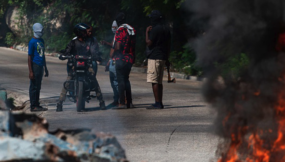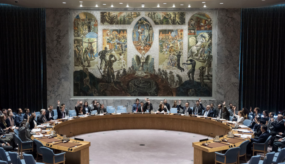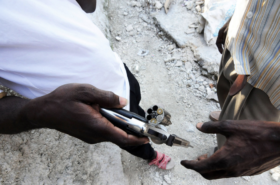Posted on 24 Apr 2025
Bodies hanging from bridges; beheadings and other brutal executions; assassinations, including of police officers and innocent youths; kidnapping and fear-mongering – the violent acts carried out by criminal groups often resemble those of terrorists. Yet they have been treated differently, both in terms of data collection and criminal prosecution. This could change as a result of President Donald Trump’s executive order designating organized criminal groups as foreign terrorist organizations (FTOs).
Violent activity by criminal groups is not classified as terrorism in the Global Terrorism Index. Yet the massacre of 207 people by criminal gangs in Haiti in December 2024 would rank as the second deadliest terrorist attack in 2024. To put things in perspective, 7 555 people were killed in terrorist attacks worldwide in 2024; in Haiti alone, there were 7 302 homicides last year. The number of homicides in Mexico in 2024 was 25 469, many of them directly attributable to organized crime. In stark terms, organized crime kills far more people than terrorism.
It could be argued that the motivations of criminal and terrorist groups are very different. Although both use violence, organized criminal groups seek to profit, while terrorist groups are usually politically or ideologically motivated. Furthermore, the most efficient criminal networks are those that act discreetly, while terrorists typically seek to attract attention.
Nevertheless, there are plenty of examples of criminal groups using terrorist tactics, such as bombings and assassinations carried out by the Italian mafia and Pablo Escobar’s Medellín cartel, as well as narco-terrorist cartels in Mexico. As explained by Roberto Dondisch, a distinguished fellow at the Stimson Center, such acts are designed ‘to create terror, to make people afraid of them and to send a signal to the police, politicians or other cartels in order to control markets’.
Freer hands
On his first day in office, President Trump issued an executive order designating cartels as foreign terrorist organizations on the grounds that they pose a threat to national security, a point echoed in the latest assessment by the US intelligence community. By declaring a national emergency to address the threat, the goal is to ensure ‘total elimination’ of a number of cartels in the US and their ‘ability to threaten [its] territory, safety, and security’. What does this mean in practice?
‘The FTO designation raises the profile of these groups and affords agencies more authority and resources to pursue them,’ said Celina Realuyo, adjunct professor at the George Washington University. The US already has a wide range of laws to pursue criminals at home and abroad – such as the Racketeer Influenced and Corrupt Organizations Act and the Kingpin Act – but these have to go through judicial review to obtain warrants and permissions to act. ‘If you are going after FTOs, your hands are much freer to act,’ said Dondisch.
In addition, to detain people who are trafficking arms to Mexico, for example, authorities must prove that the weapons are intended for use by cartels. With the executive order, ‘you don’t have to show premeditated intention,’ said Dondisch. ‘This could be a game changer.’
Be afraid
Providing material support to FTOs is a crime punishable by civil and criminal penalties, including up to life in prison. Under American law, material support can include anything from providing transportation or communications equipment to funds or financial services. ‘A lot of people who have benefited, immorally but legally, from trading with drug-trafficking groups should be very afraid,’ warned Dondisch. Moreover, as Vanda Felbab-Brown of the Brookings Institution noted, the arm of the law is very long, as the FTO designation has no territorial limitation: ‘The Justice and Treasury Departments could investigate, prosecute and sanction any entity in the world that deals with FTO-designated cartels,’ she said.
It remains to be seen how US authorities use this opportunity, not least because many enablers of Mexican cartels are based in the US. There are also concerning legal grey areas. For example, people who pay extortion fees to designated groups, even under duress, could legally be considered to be providing material support. And will American arms manufacturers whose weapons end up in Mexico be prosecuted for aiding and abetting a FTO? Will banks that are wittingly or unwittingly moving cartel money be held accountable and subject to secondary sanctions? ‘For many enablers, this could really change the way they do business,’ said Dondisch.
While the executive order is focused on the ‘total elimination’ of the presence of the eight designated cartels in the US, it also highlights the need to neutralize their ability ‘to threaten the territory, safety and security of the United States through their extraterritorial command-and-control structures’. According to Realuyo, this could include freezing the financial assets of the designated groups, including in foreign jurisdictions; prosecuting individuals in other jurisdictions for providing material support to the designated organization; imposing sanctions or travel bans on individuals affiliated with an FTO; and lobbying other countries to designate the group as a terrorist organization, enabling coordinated actions such as arrests, extraditions and surveillance.
Under the executive order, could the US take unilateral action to hunt down one of the FTOs, for example in Mexico? Realuyo did not rule out the possibility, noting that, while controversial, a designation can support military or covert operations abroad under counterterrorism authorities. For Dondisch, such unilateral action would not only be a violation of international law but would also be counterproductive: ‘There is good cooperation between the US and Mexican armies and navies,’ he said. ‘Such a move would shut down channels of cooperation. Instead, we should be focusing on coordinated operations.’
Critics and copiers
The designation of cartels as FTOs has its critics. Some have warned that a purely securitized approach will be insufficient. For Dondisch, a military response to an economic issue will have limited results. Instead, you have to address what motivates the cartels, namely money: ‘If the money dries up, the cartel goes away,’ he said. Felbab-Brown cautioned that the president’s proposals are ‘fraught with grave risks’. And Anna Sergi, a professor of criminology at the University of Essex, warned that ‘a singular focus on designating groups as terrorists may result in increased militarization of law enforcement and border security’, which could ‘exacerbate tensions and lead to further violence’. This is precisely what deterred former presidents Biden and Obama, who decided against such a designation.
Some countries have followed the US’s lead. A month after President Trump’s executive order, Argentina designated the Venezuelan criminal gang Tren de Aragua as a terrorist group, Canada listed seven organizations as terrorist entities under the Criminal Code, and Peru and Ecuador are planning to follow suit. The EU has also announced that it will strengthen police powers to tackle foreign threats, for example by extending the EU sanctions regime to criminal networks and giving law enforcement greater access to suspects’ bank transactions.
Surely, if members of organized criminal groups act like terrorists, they should be treated as such. That said, it is not yet clear how far the US and others who have designated organized criminal groups as foreign terrorist organizations will go in using the powerful tools at their disposal against the cartels and those who enable them – and whether these measures will be compatible with international law.



